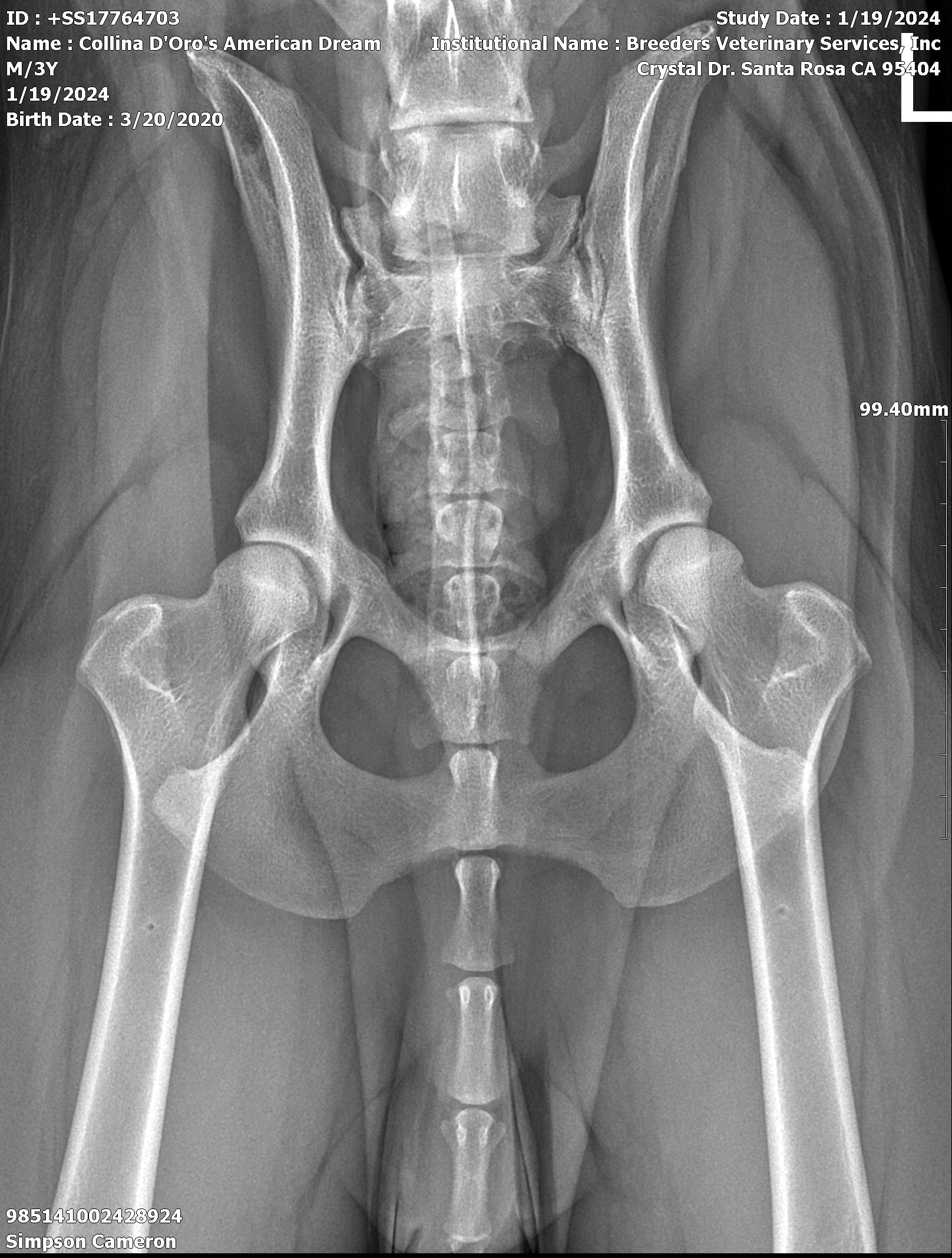The Hip Evaluation for dogs, according to the OFA (Orthopedic Foundation for Animals) standard, is a critical assessment designed to detect hip dysplasia and other hip joint abnormalities. This evaluation involves taking radiographic images (X-rays) of the dog’s hips, which are then reviewed by veterinary radiologists to identify any signs of poor hip joint conformation. The goal is to spot issues that could lead to arthritis, pain, and mobility problems as the dog ages.
Regular elbow evaluations, especially for breeds predisposed to joint problems, are a key part of maintaining overall dog health and well-being.
DOGG!T champions these principles to ensure the health and well-being of dogs, promoting responsible breeding practices and early detection of elbow conditions. All breeding dogs on our platform have provided health clearances that have passed the DOGG!T standard.
- Afghan Hound
- Airedale Terrier
- Akita
- Alaskan Malamute
- American Bulldog
- American Eskimo Dog
- American Foxhound
- American Staffordshire Terrier
- American Water Spaniel
- Anatolian Shepherd Dog
- Australian Cattle Dog
- Australian Shepherd
- Australian Terrier
- Basenji
- Basset Hound
- Beagle
- Bearded Collie
- Bedlington Terrier
- Belgian Malinois
- Belgian Sheepdog
- Belgian Tervuren
- Bernese Mountain Dog
- Bichon Frise
- Black Russian Terrier
- Bloodhound
- Border Collie
- Border Terrier
- Borzoi
- Boston Terrier
- Bouvier des Flandres
- Boxer
- Boykin Spaniel
- Briard
- Brittany
- Brussels Griffon
- Bull Terrier
- Bulldog
- Bullmastiff
- Cairn Terrier
- Canaan Dog
- Cardigan Welsh Corgi
- Cavalier King Charles Spaniel
- Chesapeake Bay Retriever
- Chihuahua
- Chinese Crested
- Chinese Shar-Pei
- Chow Chow
- Clumber Spaniel
- Cocker Spaniel
- Collie
- Curly-Coated Retriever
- Dachshund
- Dalmatian
- Dandie Dinmont Terrier
- Doberman Pinscher
- Dogue de Bordeaux
- English Cocker Spaniel
- English Foxhound
- English Setter
- English Springer Spaniel
- English Toy Spaniel
- Entlebucher Mountain Dog
- Finnish Lapphund
- Finnish Spitz
- Flat-Coated Retriever
- French Bulldog
- German Pinscher
- German Shepherd Dog
- German Shorthaired Pointer
- German Wirehaired Pointer
- Giant Schnauzer
- Glen of Imaal Terrier
- Golden Retriever
- Gordon Setter
- Great Dane
- Great Pyrenees
- Greater Swiss Mountain Dog
- Greyhound
- Harrier
- Havanese
- Icelandic Sheepdog
- Irish Red and White Setter
- Irish Setter
- Irish Terrier
- Irish Water Spaniel
- Irish Wolfhound
- Italian Greyhound
- Japanese Chin
- Japanese Spitz
- Keeshond
- Kerry Blue Terrier
- King Charles Spaniel
- Komondor
- Kuvasz
- Labrador Retriever
- Lakeland Terrier
- Leonberger
- Lhasa Apso
- Lowchen
- Maltese
- Manchester Terrier
- Maremma Sheepdog
- Mastiff
- Miniature Bull Terrier
- Miniature Pinscher
- Miniature Schnauzer
- Neapolitan Mastiff
- Newfoundland
- Norfolk Terrier
- Norwegian Buhund
- Norwegian Elkhound
- Norwegian Lundehund
- Norwich Terrier
- Nova Scotia Duck Tolling Retriever
- Old English Sheepdog
- Otterhound
- Papillon
- Parson Russell Terrier
- Pekingese
- Pembroke Welsh Corgi
- Petit Basset Griffon Vendeen
- Pharaoh Hound
- Plott
- Pointer
- Polish Lowland Sheepdog
- Pomeranian
- Poodle (Miniature, Standard, Toy)
- Portuguese Podengo Pequeno
- Portuguese Water Dog
- Pug
- Puli
- Pumi
- Pyrenean Shepherd
- Rat Terrier
- Redbone Coonhound
- Rhodesian Ridgeback
- Rottweiler
- Saint Bernard
- Saluki
- Samoyed
- Schipperke
- Scottish Deerhound
- Scottish Terrier
- Sealyham Terrier
- Shetland Sheepdog
- Shiba Inu
- Shih Tzu
- Siberian Husky
- Silky Terrier
- Skye Terrier
- Sloughi
- Small Munsterlander Pointer
- Soft Coated Wheaten Terrier
- Spanish Water Dog
- Spinone Italiano
- Staffordshire Bull Terrier
- Standard Schnauzer
- Sussex Spaniel
- Swedish Vallhund
- Tibetan Mastiff
- Tibetan Spaniel
- Tibetan Terrier
- Toy Fox Terrier
- Treeing Walker Coonhound
- Vizsla
- Weimaraner
- Welsh Springer Spaniel
- Welsh Terrier
- West Highland White Terrier
- Whippet
- Wire Fox Terrier
- Wirehaired Pointing Griffon
- Xoloitzcuintli
- Yorkshire Terrier
DOGG!T provides support in vetting all breeders in our network and our Matchmaker services will provide you with all of the insights on any external breeder you are looking at, and provide you with a ‘scorecard’ with all the reasons why we approve or disapprove of their breeding practices. Our goal is to prevent the irresponsible breeding of dogs. We are dedicated to the wellbeing of dogs, and committed to creating the first ever health regulated breeder resource. We are a team built up of the country’s leading experts on dog breeding, health requirements, and dog behavioral psychology. Backed by science and generations of responsibly breeding healthy dogs. We are people who advocate for the health and wellbeing of dogs. Our mission is to prevent dogs who end up in shelters, decrease health issues in all breeds, and prioritize the importance of responsible dog breeding. Our mission is to prevent any and all irresponsibly bred dogs from having a life of potential health and temperament problems. We are dedicated to the wellbeing of dogs, and have created the first of it’s kind health verified breeder resource.
